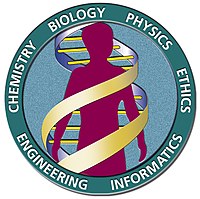
Photo from wikipedia
Allogeneic hematopoietic stem cell transplantation (allo-HSCT) is an established treatment option for myeloid neoplasms (MN). In rare cases, the development of de novo hematologic malignancies derived from cells of donor… Click to show full abstract
Allogeneic hematopoietic stem cell transplantation (allo-HSCT) is an established treatment option for myeloid neoplasms (MN). In rare cases, the development of de novo hematologic malignancies derived from cells of donor origin, named donor cell hematologic neoplasm (DCHN), can occur. Although some mechanisms have been suggested, the etiological factors and mechanisms involved in DCHN onset remain elusive. Moreover, DCHN is an extremely unusual allo-HSCT complication. But it provides a useful in vivo model to understand the genomic processes driving the leukemic transformation of donor stem cells. This study collects the first large cohort in which whole exome sequencing (WES) was performed in several post-transplant bone marrow (BM) samples from DCHN patients and their donors. A cohort of seven patients (Table 1 and Online Supplementary Appendix) recruited from three hospitals belonging to the Spanish Group of Hematopoietic Transplantation (GETH) and their donors were included. The study included 32 BM samples from different time points after allo-HSCT (Online Supplementary Figure S1) as well as one peripheral blood (PB) sample from each donor. The research protocol was approved by the Ethics Committee of Gregorio Marañón General University Hospital. The study WES workflow is summarized in Figure 1 and the Online Supplementary Methods. The results of the analysis of the mutational profiles obtained from the sequential post-HSCT samples demonstrated high intra-tumor genetic heterogeneity and clonal dynamics for all seven donor cell myeloid neoplasm (DCMN) cases (Figure 2). Among the altered genes, 27 variants in 26 strong candidates with oncogenic potential were found. This analysis showed 19 variants in genes associated with RNA processing and metabolism (LUC7L2, NOP14), cell differentiation (LAMA5, SKOR2, EML1), signal transduction (SNX13, IRS1, TENM2), including notch signaling pathway (NOTCH4, DTX1) and ERBB2 signaling pathway (GRB7), immunity regulator (MEFV), histone deacetylase (GSE1), DNA damage response (PNKP), post-translational modifications (SENP7), transcription factor (TAF1L, ZKSCAN2, ZNF461), and apoptotic process (MEGF10), as well as eight mutations in seven genes commonly found in adult acute myeloid leukemia (AML) or myelodysplastic syndromes (MDS) (SETBP1, DNMT3A, TET2, RUNX1, CSF3R, EP300 and IDH2). All these mutations were confirmed by a customized targeted gene panel designed ad hoc to validate the variants selected in the WES which also included the most recurrent mutations in MN (Online Supplementary Appendix). By this approach, the gene panel analysis also allowed identification of mutations in CSF3R, NPM1, TP53 and ASXL1 genes (Online Supplementary Table S1). Analysis of CNV revealed that the most common chromosomal alterations in DCMN were monosomy 7 (-7) or chromosome 7 abnormalities, which were detected in 6 out of 7 patients (Figure 2 and Online Supplementary Figures S3-S9). Regarding the analysis performed on donor samples, copy number variation (CNV) analysis of stem cell apheresis from donor 1 revealed -7. Four years later, the recipient developed a donor cell myelodysplastic syndrome (DC-MDS), which showed -7 together with other molecular (SETBP1, LUC7L2) and cytogenetic alterations. This case highlights what has been described by other authors who suggested that SETBP1 mutations occur at later stages of disease evolution, influencing the clinical course of the disease rather than its initiation; they are associated with a poor prognosis. The other six donors presented variants in genes that have been involved in hematologic or solid tumors: KLLN (c.445T>A), HOXD4 (c.242A>T), MSR1 (c.877C>T), HOXD12 (c.213T>C), MOS (c.426_432dupTGGCAAC), SETBP1 (c.3962G>A), MAD1L1 (c.851A>G). Of note, variants present in
Journal Title: Haematologica
Year Published: 2020
Link to full text (if available)
Share on Social Media: Sign Up to like & get
recommendations!